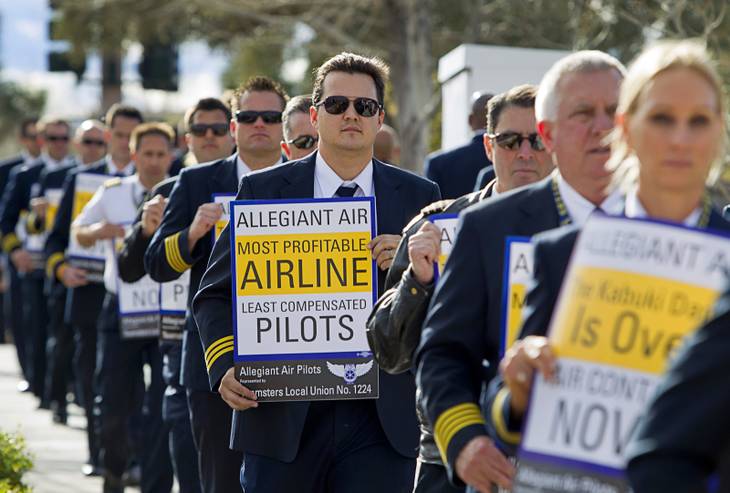Allegiant Air pilots have appealed a judge’s ruling that they did not have a legal right to walk off the job when they tried to go on strike two months ago.
Their union, the Teamsters, announced today that it filed the appeal Friday with the U.S. Court of Appeals for the Ninth Circuit.
In a news release, union officials said a May 1 ruling by U.S. District Judge Andrew Gordon was flawed in granting Las Vegas-based Allegiant a preliminary injunction.
Gordon wrote that “it would be unlawful for the pilots to strike at this point,” and he barred the Teamsters and its members from striking, picketing or taking part in a sick-out, slow-down or other concerted action to disrupt the discount carrier’s regular operations.
The Teamsters had promised to appeal when Gordon issued the order.
Today, the union cited Allegiant pilots’ right to strike against a company it alleges has violated workplace rules. But in some ways, the Teamsters seemed to soften its stance, with an Allegiant pilot talking about ending the spat.
“As professional airline pilots, we do our very best to serve our passengers. We also have a responsibility to speak out about the problems we face day-to-day that impact our ability to do our jobs,” pilot Cameron Graff said in a prepared statement.
“We look forward to an end to all these hours in court and a time when we can sit down and negotiate a new contract that secures the future prosperity of Allegiant Air and the Allegiant Air pilots,” Graff said.
In a statement, Allegiant spokeswoman Kimberly Schaefer said the company “is confident” that Gordon’s ruling will be upheld.
“In the meantime, we remain steadfast in our belief that the efforts of the parties should continue to be focused on a constructive negotiation process,” she said.
The pilots voted in August 2012 to join Teamsters Local 1224 but still do not have a collective bargaining agreement under the union. Amid protracted contract talks, the pilots voted in mid-January to authorize a strike, and the Teamsters announced April 1 that Allegiant’s more than 500 aviators would walk off the job the next day.
But hours later, U.S. District Judge Gloria Navarro granted Allegiant a temporary restraining order, halting the plans.
Airline pilots face more barriers than almost any other U.S. workers to legally strike, as lawmakers view interstate travel as vital to daily commerce. Such walkouts rarely occur.
Federal labor law requires airlines and unions follow a lengthy list of steps — negotiations, mediation, arbitration, cooling-off periods and possible White House intervention — that can last several months, if not a year or more, before both sides can legally pull the trigger on such threats as a strike or a lockout.
The Teamsters have argued that Allegiant illegally changed workplace rules and benefits while the two sides negotiated a collective bargaining agreement. This gave the pilots a right to strike, the union claimed.
Allegiant has argued that a strike would be illegal because the Teamsters had not exhausted the dispute-resolution steps called for by the Railway Labor Act, which covers the airline industry.
